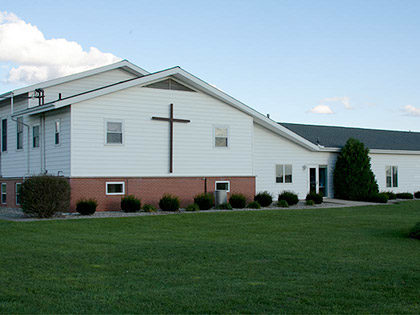Daniel 5
Introduction:
Structure of Daniel 2-7, 3-6, 4-5
Two feasts today – we’re going to have one and we are reading about one.
The one we are going to have we are celebrating the Lord, his graciousness toward us, and enjoying fellowship one with another.
The feast we are reading about was an affront to the Lord, a celebration of sin, and an enjoyment of sin.
Text: Daniel 5:1-31
Theme:
Verses 1-4
We have some information about this event that comes to us from outside the Bible, which sheds a little light on Belshazzar and this event.
Belshazzar was the last king of Babylon and he was not king for very long at all. But before he was king, he served as a chief officer during the reign of Neriglissar. After Neriglissar came a new king, called Nabonidus. We don’t know in what capacity Belshazzar served under Nabonidus, but he must have been serving in a high position.
Babylon got into a war with the Medes and the Persians and Nabonidus led a large army out to fight them in battle. Nabonidus was overwhelmingly defeated, and fled. Just a few days after Nabonidus was defeated, the Medes and Persians captured Babylon.
During that three day period, Belshazzar must have seized the reigns of leadership and declared himself the de facto king.
We know from two sources outside of the Bible that a large feast was occurring the night that the Medes and Persians took the city, so while this feast is going on, there is an army outside of the gates.
This feast is probably a celebration of Belshazzar becoming king, or perhaps it is intended to raise morale about the recent defeat.
It was also a tremendous display of arrogance. Babylon was situated in such a way that it would not be easy at all for an army to capture, so Belshazzar and the other nobles appear unconcerned about it, despite Nabonidus’ defeat.
Babylon also had a river flowing through it, so they would be able to last through a siege for a very long time. They had food and water and all they needed. Having a feast in the middle of a siege might have been a way of prideful boasting about that.
But they did something phenomenally stupid in that they took the gold and silver vessels, meant for serving the Most High God, out of storage so that Belshazzar and all of his guests could drink from them. And they gave praise to many false gods as they did so. Insulting the Most High God is the last thing that they should have been doing in the position that they were in.
Link: And things got pretty bad pretty quick as a result.
Verses 5-9
All the people at this party got real sober, real fast, I bet! A disembodied human hand writing on a wall would have been horrifying. Even more horrifying when you realize the writing is still there and it wasn’t a hallucination.
Belshazzar promises to promote whoever can read the writing to the third position in the kingdom. Third is pretty interesting. It sort of hints that perhaps Belshazzar only considered himself king in Nabonidus’ absence, or perhaps he intended to give Nabonidus second place when and if he should return. It could also mean that the queen had second in command.
He must suddenly be feeling very desperate. The army outside his walls is probably being considered more seriously now in light of this frightening and supernatural occurrence.
Verses 10-12
This is probably not Belshazzar’s wife. It said in earlier verses that Belshazzar’s wives and concubines were already at the party, and this lady is referred to as “the queen.” Perhaps she was the wife of Nebuchadnezzar or Nabonidus.
The things she declared to Belshazzar should have been known by him. She says “King Nebuchadnezzar, your father – your father the king” – she says your father twice. I think this was intended to reinforce that he ought to know this, seeing as Nebuchadnezzar was his father.
Verses 13-23
Before interpreting the dream, Daniel dismissed the gifts being offered to him by the King. The intention is probably to show that he cannot be bought. Perhaps also he doesn’t want the gifts because he knows what is coming. I know I wouldn’t want to be dressed in purple and wearing a golden chain around my neck on the night that the Medes and the Persians conquer the city.
“What, this purple robe and this golden chain? It’s not really such a big deal. You heard I was third in command? Oh, yes, about that. You see, that’s only been for about three hours and I didn’t really want to be.”
Daniel started his interpretation with a rebuke for Belshazzar. He recounts to him the story we heard just last week and tells Belshazzar that, though he knew all of this, he did not humble his own heart.
In fact, he has seriously insulted and dishonored God by using things from his holy temple for profane purposes and to honor gods “which do not see, or hear, or know.” He owes everything to God, even his very breathing is a gift from God, and yet he has behaved this way – knowing what this type of behavior meant for Nebuchadnezzar.
Verses 24-28
These were Aramaic words. Probably they could be read and recognized by the king and all the other people. The problem was that it was not known what was meant by the words. But they certainly sounded ominous.
Mene = numbered. Tekel = weighed. Parsin = divided, also, parsin sounds like the Aramaic word for Persia.
So, what is written is literally – numbered, numbered, weighed, divided.
The time is up. God has determined that Belshazzar did not live up to God’s standard of righteousness. The kingdom will be divided and given to the Medes and Persians. The time for repentance and second chances is over. Belshazzar, having known about the events of Nebuchadnezzar’s life, had sufficient opportunity to realize what would occur if he chose to exalt himself over God. He did not learn from Nebuchadnezzar’s life and chose to continue in wrong doing.
Link: Daniel does not say whether Belshazzar would or would not survive this. In a too little too late move Belshazzar fulfills his word and has Daniel clothed with purple and promoted to the third highest position of rule within the kingdom.
Verses 29-31
*Tell how the Medes and Persians conquered Babylon – river running through, etc.*
The walls surrounding the city of Babylon were formidable… there were two sets of double walls extending for miles (the outermost system being seventeen miles in length). The outer walls were approximately twenty-five feet in width and rose to a height of at least forty feet. These fortifications were too difficult to challenge, and so according to Herodotus and Xenophon, the Medo-Persian army diverted water from the Euphrates River (which ran under the walls of Babylon) into a marsh. With the level of the water lowered, the soldiers were able to wade the river under the walls and enter the city.100
Xenophon added that the city was invaded while the Babylonians were feasting in a time of drunken revelry,101 and Herodotus also related that a festival was in progress.102 As a matter of fact, Xenophon cited the festival as [Vol 18: Dan, p. 168] the reason the Persians chose to attack Babylon on that particular night. – New American Commentary
So, that river running through Babylon that was supposed to make them immune to siege ended up making them an easy target. While the leadership was drunk and partying, the Medes and the Persians walked in.
I’d love to know how precise the timing of all of this was. When the writing on the wall came, where were the Medes and the Persians? Were they beginning to divert the water so they could wade into the city? Was the idea just entering into their heads? When Daniel said “your kingdom is divided and given to the Medes and Persians,” what was happening? I can almost imagine the army sneaking under the wall through the river while he says that.
The prophetic dream that Nebuchadnezzar had many years ago is beginning to be fulfilled. Babylon has fallen. Human history has now moved to the stage of the silver chest and arms. The Medes and the Persians have received the kingdom.
And received is a great word choice here. It doesn’t say that he took or conquered, but that he received. Several times in Daniel leading up to this we have read that God “gives the kingdoms of man to whom he will.” Nebuchadnezzar thought the kingdom was built by his hand, but God humbled him and showed that it is given to whom He wills. So, Darius the Mede didn’t take the kingdom or conquer it. He received it. God took it from Belshazzar and gave it to Darius.
Application:
- Opportunities for repentance are finite. *elaborate*
- Rebelling against God ultimately leads to catastrophe. *elaborate*
- God is sovereign. *elaborate*

